Stay in the know on all smart updates of your favorite topics.
Moving from a linear to a circular economy means minimising the waste and pollution by reducing, recycling and reusing. The City of Amsterdam aims to redesign twenty product- or material chains. The implementation of material reuse strategies has the potential to create a value of €85 million per year within the construction sector and €150 million per year with more efficient organic residual streams. Amsterdam set up an innovation program on the circular economy; www.amsterdamsmartcity.com/circularamsterdam. By converting waste into electricity, urban heating and construction materials, the Amsterdam Electricity Company generates 900 kWh per 1000 kg of waste. 75% of the sewage system is separated for waste and rain water and the silt which remains after treating waste water is converted into natural gas. Share your innovative concepts and ideas on circular economy here.
Are you an innovative entrepreneur? The In Residence Open Events program might be your chance to cooperate with Amsterdam!

Want to test your innovation during an open event such as Amsterdam Pride or the Amsterdam marathon? And looking for the opportunity to cooperate with the city in the long run?
The In Residence Open Events programme might be something for you. We have 8 broad defined challenges, ranging from circular economy to safety, from mobility to extreme whether. Basically we're looking for all innovations that can have an positive impact on the city and the event of the future!
During the programme you get:
- The opportunity to pilot your solution at an open event in Amsterdam, such as Amsterdam Pride or the Amsterdam Marathon
- 15K test budget to execute this pilot
- Guidance by an experienced mentor
- Access to the large municipality network
- The opportunity for long term cooperation in case of a succesfull pilot
- Large exposure and feedback opportunities
Interested to see our programme, the challenges and opportunity this brings for you?
See our website, www.innovatiepartners.nl, or see most recent LinkedIn post: https://www.linkedin.com/posts/gemeente-amsterdam-innovatie_inresidence-amsterdam-innovatie-activity-7163881081757253632-6soh?utm_source=share&utm_medium=member_desktop
For questions or thoughts, you can reach out to Mark Stoevelaar, project manager of the In Residence programme.
- mark.stoevelaar@amsterdam.nl
- +31621193028
Doe mee aan de Green Innovation Hub contest!

In Almere en de provincie Flevoland vinden de grootste gebiedsontwikkelingen van Nederland plaats zoals Hortus, Pampus, Zuidoever. Om echt toekomstgericht te kunnen bouwen en als voorbeeld te dienen voor de rest van Nederland, organiseren zij de Green Innovation Hub contest ’24. In deze competitie worden organisaties uitgedaagd om met digitaal gedreven toepassingen te komen op het gebied van duurzame energie, mobiliteit of slim wonen.
Ben jij een start-up, scale-up of een innovatief kleinbedrijf (MKB), en heb jij een digitaal gedreven toepassing op het gebied van duurzame energie, mobiliteit of slim wonen? Is jouw oplossing klaar om verder te groeien, te versnellen en op te schalen? Een oplossing waarmee jij echt impact kan maken? Doe dan mee met de Green Innovation Hub Contest ’24.
Op 6 maart wordt op basis van de ingezonden video-pitches een selectie gemaakt van de tien bedrijven die worden uitgenodigd voor het Green Innovation Hub Café. Op woensdag 17 april vindt de Contest Day plaats, tevens de officiële opening van de GIH 3.0 op de 9e verdieping. Tijdens dit evenement zullen de 10 deelnemers hun pitch presenteren, met een maximale duur van 4 minuten. Na de pitches krijgt de jury de gelegenheid om vragen te stellen. De winnaar wordt door experts verder geholpen en begeleid.
Check de website link voor meer informatie!
Community Meetup Amsterdam Donut Coalition!
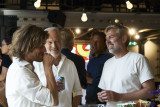
Amsterdam Donut Coalitie Community Meetup!
Op 29 februari organiseert de Amsterdam Donut Coalitie een community meetup in Noord over het voedselvraagstuk.
Voedsel is een essentiële behoefte met aanzienlijke invloed op het milieu. Daarnaast verbindt het gemeenschappen. Daarom organiseren wij een meetup om initiatieven uit Noord, Zuidoost en Nieuw-West samen te brengen en in gesprek te laten gaan.
Op deze bijeenkomst zullen inspirerende initiatieven zoals Tuindorp Delicious, Wortel met Sjeu en Tuinen van Brasa hun inzichten delen over hun aanpak en de rol die de donut economie speelt in de transformatie van voedselsystemen.
Vervolgens gaan we in groepen uiteen om samen het thema voedsel te onderzoeken vanuit de 4 lenzen. Wat gebeurt er als je voedsel bekijkt vanuit een sociaal, ecologisch, lokaal of globaal perspectief?
Dit wordt een waardevolle gelegenheid om te leren, te delen en gezamenlijk na te denken over de toekomst van ons voedselsysteem. Breng je nieuwsgierigheid, ideeën en enthousiasme mee!
🗓️ Datum: Donderdag 29 februari
🕒 Tijd: 16:00-17:30
📍 Locatie: Noord, Tuindorp Delicious, Zonneplein 18a, 1033 EK Amsterdam
Schrijf je hier in: https://forms.gle/jidLbQfjdKbHzNXu9
AMS Scientific Conference: Reinventing the City - Blueprints for messy cities?

Reinventing the City Conference, April 23-25, 2024, Amsterdam. The ticket sale has started! Purchase your ticket and be part of this amazing event!
Join us for the Reinventing the City conference, where we will explore sustainable urban transformations on a metropolitan scale. Scientists, policymakers, students, and industry partners will come together to share insights, inspire action, and shape the future of our cities.
Purchase your ticket here
About the conference
The AMS Scientific Conference (AMS Conference) explores and discusses how cities can transform themselves to become more livable, resilient and sustainable while offering economic stability. Cities are innovation hubs, where an increasing number of people live, work, recreate, interact, and care. The urban fabric is where major transitions take place, catalyzing advancements in mobility, circularity, renewable energy, climate adaptation, urban food systems and digitization. Precisely for these reasons, our cities set the agenda for improving the livability and sustainability of our world.
Cultivating transformation
To foster improved urban environments, we need scientific and societal insights into our complex urban systems, into how natural and social processes are interconnected and reach tipping points, into the good, the bad and the ugly of our cities. We need amazing discoveries, technical and social innovations to transform the ugly, leave the bad behind and reach for the good. And most of all, we need to make the city together, because WE are the city.
Theme of this year
In this second edition of “Reinventing the City”, the overarching theme will be ‘Blueprints for messy cities? Navigating the interplay of order and complexity'. In three captivating days, we will explore ‘The good, the bad, and the ugly’ (day 1), ‘Amazing discoveries’ (day 2) and ‘We are the city’ (day 3).
Day 1: 'The good, the bad, and the ugly'
The first day of the AMS Conference primarily focuses on the messiness: the various aspects of urban development and innovation. "The good" refers to success stories and positive developments in cities. "The bad" relates to challenges and issues that cities face, and "the ugly" pertains to less attractive aspects of urban development. This theme explores how cities, both in terms of space and users, evolve in both positive and negative ways.
Day 2: 'Amazing discoveries'
The second day of the conference concentrates on pioneering research and innovations, both technical and social, in the field of urban renewal and sustainability. Here, we ask participants to present and discuss new and exciting discoveries that have a positive impact on urban areas. We focus on areas such as mobility, food, circularity, energy, climate resilience, and smart data.
Day 3: 'WE are the city'
This theme emphasizes that the people living and working in cities play an essential role in urban renewal and development. This can involve community engagement, citizen participation, public-private partnerships, and the importance of involving all stakeholders in the city. Only together can we create livable and inclusive cities.
Topics
mobility | circularity | energy transition | climate adaptation | urban food systems | digitization | diversity | inclusion | living labs | transdisciplinary research
Registration Options
- Full Conference Access: Immerse yourself in the entire event, spanning three captivating days, each dedicated to a distinct theme:
- Day 1: The Good, the Bad, and the Ugly
- Day 2: Amazing Discoveries
- Day 3: We Are the City
- Single-Day Access: If your schedule is tight, you can opt for a single-day pass to attend the day that interests you the most.
- Student Access: To encourage student participation in our conference, we offer exclusive student rates. Universities often provide funding opportunities to support students in attending conferences like ours. We encourage students to explore the available funds and grants at their respective universities. It's a great way to help offset the costs of your participation. Please note that student passes are available to currently enrolled students with valid student IDs.
Conference Fees
- Full Conference Pass: €650,-
- Single-Day Pass: €150,-
- Student Full Conference pass: €200,-
Curious about Symbiocene starterpack
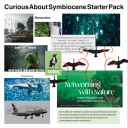
What would the world look like if we lived in harmony with the other organisms around us? Step into the Symbiocene during the fourth edition of 'Curious about...'! A new era where nature is not just about humans, but where we become partners in coexistence. To get you started we’ve created a colourful collection of books, podcasts, initiatives, and films that will help you understand what the future could look like if Earth and Humanity heal their toxic ties.
#symbioceen #starterpack#curiousabout #alab #vandejong #werkaandewereld
#4 Curious About... The Symbiocene Earth & Humanity: a Toxic Affair

What would the world look like if we lived in harmony with the other organisms around us? Step into the Symbiocene! A new era in which nature doesn’t revolve solely around human life, but where we become partners in coexistence. Cities would transform into nature reserves, full of eco-friendly buildings constructed from biobased materials, ensuring equal rights for all living inhabitants. What would we wear? What would we eat? What would we invent? Join us as we explore the dawn of an epoch in which Earth and Humanity heal their toxic ties. To live happily ever after.
Toekomstverkenning publieke platformen

Wat is de impact van (platform)technologie op de overheid van de toekomst en haar rol in de (door o.a. technologie) veranderende samenleving? Wil jij de toekomst tastbaar en beeldend maken en meedoen met een groeiende beweging van jonge (t/m 35 jaar) visionairen, denkers en doeners?
Doe dan mee aan de toekomstverkenning publieke platformen georganiseerd door FUTUR en Provincie Zuid-Holland en ondersteund door Scape Agency.
Vanuit verschillende thematische invalshoeken gaan we hiermee aan de slag in groepen van ongeveer 10 jonge professionals vanuit verschillende organisaties (Publiek, privaat en kennis). Een beschrijving van de eerste thema’s vind je hieronder:
Thema's
- Circulair 2050 - De ambitie om in 2050 niet alleen klimaatneutraal, maar ook nog eens onze economie 100% circulair in te richten, vergt een omslag in denken en doen. Hoe buigen we lineaire ketens rond? Waar beginnen we? En cruciaal: welke rol speelt het publieke platform in deze transitie?
- Zicht op maatschappelijke vraagstukken met data – Data is onmisbaar voor het oplossen van maatschappelijke vraagstukken. Hoe zetten we data verantwoord in voor het benutten van deze kansen?
-Digitale Waterschappen – Bestuurt AI in 2050 het waterbeheer, of wordt water juist lokaal beheert?
-Ambtenaar van de toekomst – Als steeds meer taken worden overgenomen door (platform)technologie, wat is dan de rol van de ambtenaar van de toekomst en welke vaardigheden worden gevraagd?
- Participatie – hoe kan de overheid betrokkenheid van inwoners, bedrijven en maatschappelijke organisaties vormgeven bij beleid en besluitvorming?
- Uitvoering van de toekomst – De meeste publieke dienstverleners leveren een stand van de uitvoering aan. Hoe moet de uitvoering en publieke dienstverlening van de toekomst worden vormgegeven?
- Online leefwereld van jongeren – Welke publieke waarden moeten vooropstaan op social media, hoe ziet een dergelijk platform eruit en welke digitale vaardigheden van jongeren zijn cruciaal?
- Tomorrows Governance – hoe verandert de rol, organisatie en wijze van samenwerken van de overheid?
- Mobiliteit en Brede Welvaart - Wat is de impact van (platform)technologie op de bijdrage van mobiliteit aan de brede welvaart van mensen door de bereikbaarheid van banen, voorzieningen en sociale contacten in de stad, en de regio?
- Sociaal Domein – Hoe kan platformtechnologie bijdragen aan de complexe problemen in het sociaal domein? Hoe ga je toe naar een overheid die er voor de inwoner is, in plaats van de inwoner van het kastje naar de muur stuurt.
- Ethiek
Zijn een van die thema's iets voor jou? Meld je dan aan via: https://kennislab.typeform.com/to/MRNbvgIl
Wat betekent meedoen?
- Je sluit je aan bij een themagroep. En doet mee in de voorbereiding, dus het verzamelen van voorbeeldcases uit eigen werk, rapporten, studies, literatuur, films enz.
- Je doet op 13 februari mee met de visiedag (09:00 - 13:00), en bij voorkeur ook de aansluitende verbeeldingsdialoog in het Provinciehuis van de Provincie Zuid-Holland in den haag. Op deze dag werken de themagroepen met ondersteuning van ontwerpers en kunstenaars hun toekomstbeeld uit.
Je bent in maart beschikbaar voor 1 digitale of fysieke sessie voor de verdere uitwerking van het toekomstbeeld.
- Je bent op 4 april aanwezig (vermoedelijk enkel de middag) bij het slotevent ‘publieke platformen’ georganiseerd door de provincie Zuid-Holland in het provinciehuis. Op 4 april ‘exposeren’ de groepen hun toekomstbeeld aan een breder publiek, en wordt er op verschillende manier een dialoog georganiseerd tussen bezoekers, experts en bestuurders.
- Je vergroot je netwerk, je doet inspiratie op voor de vraagstukken waar jij dagelijks mee bezig bent en je hebt vooral plezier.
Toekomstmakers gezocht - Doe mee aan de publieke platformen expeditie!

Wat is de impact van (platform)technologie op de overheid van de toekomst en haar rol in de (door o.a. technologie) veranderende samenleving?
Wil jij de toekomst tastbaar en beeldend maken en meedoen met een groeiende beweging van jonge (t/m 35) visionairen, denkers en doeners?
Doe dan mee aan de toekomstverkenning publieke platformen georganiseerd door FUTUR en Provincie Zuid-Holland en ondersteund door Scape Agency.
Vanuit verschillende thematische invalshoeken gaan we hiermee aan de slag. Het streven is dat iedere groep bestaat uit een groep van 10 jonge professionals vanuit verschillende organisaties (publiek, privaat en kennis).
De thema's zijn:
- Circulair 2050 - De ambitie om in 2050 niet alleen klimaatneutraal, maar ook nog eens onze economie 100% circulair in te richten, vergt een omslag in denken en doen. Hoe buigen we lineaire ketens rond? Waar beginnen we? En cruciaal: welke rol speelt het publieke platform in deze transitie?
- Zicht op maatschappelijke vraagstukken met data – Data is onmisbaar voor het oplossen van maatschappelijke vraagstukken. Hoe zetten we data verantwoord in voor het benutten van deze kansen?
- Digitale Waterschappen – Bestuurt AI in 2050 het waterbeheer, of wordt water juist lokaal beheert?
- Ambtenaar van de toekomst – Als steeds meer taken worden overgenomen door (platform)technologie, wat is dan de rol van de ambtenaar van de toekomst en welke vaardigheden worden gevraagd?
- Participatie – hoe kan de overheid betrokkenheid van inwoners, bedrijven en maatschappelijke organisaties vormgeven bij beleid en besluitvorming?
- Uitvoering van de toekomst – De meeste publieke dienstverleners leveren een stand van de uitvoering aan. Hoe moet de uitvoering en publieke dienstverlening van de toekomst worden vormgegeven?
- Online leefwereld van jongeren – Welke publieke waarden moeten vooropstaan op social media, hoe ziet een dergelijk platform eruit en welke digitale vaardigheden van jongeren zijn cruciaal?
- Tomorrows Governance – hoe verandert de rol, organisatie en wijze van samenwerken van de overheid?
- Mobiliteit en Brede Welvaart - Wat is de impact van (platform)technologie op de bijdrage van mobiliteit aan de brede welvaart van mensen door de bereikbaarheid van banen, voorzieningen en sociale contacten in de stad, en de regio?
- Sociaal Domein – Hoe draagt platformtechnologie bij aan de complexe oplossingen in het sociaal domein? Hoe zorg je er voor dat de inwoner direct geholpen wordt, in plaats van het kastje naar de muur wordt gestuurd?
- Ethiek
Wat betekent meedoen?
- Je sluit je aan bij een themagroep. En doet mee in de voorbereiding = het verzamelen van voorbeeldcases uit eigen werk, rapporten, studies, literatuur, films enz.
- Je doet op 13 februari mee met de visiedag (09:00 - 13:00), en bij voorkeur ook de aansluitende verbeeldingsdialoog in het Provinciehuis van de Provincie Zuid-Holland in den haag. Op deze dag werken de themagroepen met ondersteuning van ontwerpers en kunstenaars hun toekomstbeeld uit.
- Je bent in maart beschikbaar voor 1 digitale of fysieke sessie voor de verdere uitwerking van het toekomstbeeld.
- Je bent op 4 april aanwezig (vermoedelijk enkel de middag) bij het slotevent ‘publieke platformen’ georganiseerd door de provincie Zuid-Holland in het provinciehuis. Op 4 april ‘exposeren’ de groepen hun toekomstbeeld aan een breder publiek, en wordt er op verschillende manier een dialoog georganiseerd tussen bezoekers, experts en bestuurders.
- Je vergroot je netwerk, je doet inspiratie op voor de vraagstukken waar jij dagelijks mee bezig bent en je hebt vooral plezier.
Doe je mee? Meld je dan hier aan: https://kennislab.typeform.com/to/MRNbvgIl
Jonge toekomstmakers gezocht!

Wat is de impact van (platform)technologie op de overheid van de toekomst en haar rol in de (door o.a. technologie) veranderende samenleving? Wil jij de toekomst tastbaar en beeldend maken en meedoen met een groeiende beweging van jonge (t/m 35 jaar) visionairen, denkers en doeners?
Doe dan mee aan de toekomstverkenning publieke platformen georganiseerd door FUTUR en Provincie Zuid-Holland en ondersteund door Scape Agency.
Vanuit verschillende thematische invalshoeken gaan we hiermee aan de slag in groepen van ongeveer 10 jonge professionals vanuit verschillende organisaties (Publiek, privaat en kennis). Een beschrijving van de eerste thema’s vind je hieronder:
Thema's
- Circulair 2050 - De ambitie om in 2050 niet alleen klimaatneutraal, maar ook nog eens onze economie 100% circulair in te richten, vergt een omslag in denken en doen. Hoe buigen we lineaire ketens rond? Waar beginnen we? En cruciaal: welke rol speelt het publieke platform in deze transitie?
- Zicht op maatschappelijke vraagstukken met data – Data is onmisbaar voor het oplossen van maatschappelijke vraagstukken. Hoe zetten we data verantwoord in voor het benutten van deze kansen?
-Digitale Waterschappen – Bestuurt AI in 2050 het waterbeheer, of wordt water juist lokaal beheert?
-Ambtenaar van de toekomst – Als steeds meer taken worden overgenomen door (platform)technologie, wat is dan de rol van de ambtenaar van de toekomst en welke vaardigheden worden gevraagd?
- Participatie – hoe kan de overheid betrokkenheid van inwoners, bedrijven en maatschappelijke organisaties vormgeven bij beleid en besluitvorming?
- Uitvoering van de toekomst – De meeste publieke dienstverleners leveren een stand van de uitvoering aan. Hoe moet de uitvoering en publieke dienstverlening van de toekomst worden vormgegeven?
- Online leefwereld van jongeren – Welke publieke waarden moeten vooropstaan op social media, hoe ziet een dergelijk platform eruit en welke digitale vaardigheden van jongeren zijn cruciaal?
- Tomorrows Governance – hoe verandert de rol, organisatie en wijze van samenwerken van de overheid?
- Mobiliteit en Brede Welvaart - Wat is de impact van (platform)technologie op de bijdrage van mobiliteit aan de brede welvaart van mensen door de bereikbaarheid van banen, voorzieningen en sociale contacten in de stad, en de regio?
- Sociaal Domein – Hoe kan platformtechnologie bijdragen aan de complexe problemen in het sociaal domein? Hoe ga je toe naar een overheid die er voor de inwoner is, in plaats van de inwoner van het kastje naar de muur stuurt.
- Ethiek
Zijn een van die thema's iets voor jou? Meld je dan aan via: https://kennislab.typeform.com/to/MRNbvgIl
Wat betekent meedoen?
- Je sluit je aan bij een themagroep. En doet mee in de voorbereiding, dus het verzamelen van voorbeeldcases uit eigen werk, rapporten, studies, literatuur, films enz.
- Je doet op 13 februari mee met de visiedag (09:00 - 13:00), en bij voorkeur ook de aansluitende verbeeldingsdialoog in het Provinciehuis van de Provincie Zuid-Holland in den haag. Op deze dag werken de themagroepen met ondersteuning van ontwerpers en kunstenaars hun toekomstbeeld uit.
Je bent in maart beschikbaar voor 1 digitale of fysieke sessie voor de verdere uitwerking van het toekomstbeeld.
- Je bent op 4 april aanwezig (vermoedelijk enkel de middag) bij het slotevent ‘publieke platformen’ georganiseerd door de provincie Zuid-Holland in het provinciehuis. Op 4 april ‘exposeren’ de groepen hun toekomstbeeld aan een breder publiek, en wordt er op verschillende manier een dialoog georganiseerd tussen bezoekers, experts en bestuurders.
- Je vergroot je netwerk, je doet inspiratie op voor de vraagstukken waar jij dagelijks mee bezig bent en je hebt vooral plezier.
Open evenementen voor het testen van innovatie [Innovation wanted!]
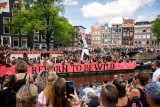
Evenementen in de stad willen we verder verduurzamen en toegankelijker maken. Vaak vinden evenementen plaats op centrale plekken waar mensen bij elkaar komen en waar veel afval, drinkwater en consumptievoorzieningen zijn. Dit zijn goede plekken om nieuwe innovaties te testen en verder te ontwikkelen. Tot 29 februari kunnen ondernemers zich inschrijven om hun innovatie te testen via het In Residence programma Open Evenementen.
In Residence programma
Innovatieve ondernemers kunnen zich inschrijven voor het In Residence programma van het stedelijk innovatieteam, waarin open evenementen in Amsterdam worden ingezet voor het testen van innovaties. Het doel van dit programma is om kennis te ontwikkelen voor zowel het verduurzamen van evenementen, als voor het vinden van praktische oplossingen voor een toekomstbestendige stad.
Geselecteerde ondernemers krijgen daarbij professionele begeleiding bij het verder ontwikkelen van hun innovatie en de mogelijkheid samen te werken met ambtenaren en evenementenorganisatoren. Voor het testen van hun innovatie krijgen ondernemers een budget tot €15.000,- toegewezen. Het programma duurt 6 maanden, van mei tot en met oktober 2024. Op 26 april worden de 8 ondernemers bekend gemaakt die dit jaar aan het programma mee zullen doen.
Het In Residence programma Open Evenementen vindt plaats in aanloop naar het jubileumjaar 2025 – het jaar van Amsterdam 750 en SAIL – dat groots gevierd zal worden in de hele stad. Innovaties die de komende tijd op evenementen worden getest en door ontwikkeld kunnen mogelijk een rol hebben tijdens de grootschalige evenementen die dat jaar plaatsvinden.
Evenementen als proeftuin
Meerdere grote evenementen nemen deel aan het programma. De organisaties van onder andere Pride en de Marathon bieden geselecteerde ondernemers mogelijkheden om innovaties op thema’s als duurzaamheid, circulair, mobiliteit, inclusie en toegankelijkheid te testen tijdens deze evenementen. Kansrijke innovaties krijgen hierdoor de mogelijkheid om door te ontwikkelen en een positieve bijdrage te leveren aan de opgaven van de stad.
Innovatieve ondernemers kunnen innovaties opgeven binnen de volgende thema's:
- Voedsel
- Circulaire materialen
- Circulaire verpakkingen
- Mobiliteit
- Inclusiviteit en toegankelijkheid
- Extreem weer
- Digitale veiligheid
Er is ook een wildcard voor een kansrijke innovatie die buiten deze categorieën valt.
De Inschrijving verloopt via: https://innovatiepartners.nl/project/open-evenementen-2024/ en sluit op 29 februari.
Meer informatie over hoe wij samenwerken met ondernemers vind je op:www.innovatiepartners.nl. Op 6 en 8 februari vinden er twee informatiewebinars plaats waarin meer verteld zal worden over het In Residence programma en de selectieprocedure. Ook is er dan ruimte om vragen te stellen.
Recap of Demoday #22
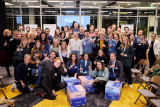
On Thursday December 14th, Amsterdam Smart City partners concluded 2023 with an afternoon full of inspiration, exchange and connections at our 22nd Demoday! Our partner Deloitte welcomed our network in The Garage, where their ‘Deloitte Studios’ department is located. In this article, we’ll give you a quick overview of the Knowledge Session, Work Sessions and Pitches. Interesting in learning more? Read the full reports by our Programme Managers Noor, Pelle and Sophie (linked below).
About our Demodays
The Demodays are one of the tools we use to stimulate innovation and encourage connection between our partners and community. The purpose of the Demodays is to present the progress of various innovation projects, ask for help, share dilemmas and involve more partners to take these projects to the next level. More information about the Demodays can be found here.
Knowledge Session: Change in the here and now, with Theory U
To kick-off our final Demoday of 2023, our brand-new partner Hieroo led an inspiring knowledge session about the change method they use for social innovation in the city: Theory U. Dorien Schneider and Maartje Krijnen taught us more about this methodology and how it can help us solve complex problems by shifting from ego to eco-thinking. Read the full report here.
Work sessions
After the plenary Knowledge Session we split up in different worksessions, each exploring regional innovation challenges. As always, we had set up the sessions’ topics and moderation in collaboration with our partners.
Mobility | Decision-making along the principles of Inclusive Prosperity – Jurhan Kwee (Municipality of Amsterdam)
In The Netherlands, the concept of ‘Inclusive Prosperity’ is on the rise. Policy makers are busy defining this concept, figuring out how to put this concept into practice and what it means for their decision-making process. Together with his colleagues at the Municipality of Amsterdam, Yurhan Kwee hosts sessions on decision-making along the principles of Inclusive Prosperity. With the input he gathers, he hopes to make the decisions needed for our Inclusive Prosperity ambitions more understandable and transparent, both for Amsterdam’s administrators and councillors as well as its citizens. Read Pelle’s recap article here.
Digital | Data Commons Collective: Using data for a liveable city – Lia Hsu (Amsterdam Economic Board) and Simone van der Burg (Waag)
In the big tech-dominated era, data has been commercially exploited for so long that it is now hard to imagine that data sharing might also benefit the community. Yet that is what a collective of businesses, governments, social institutions and residents in Amsterdam aim to do. Sharing more data to better care for the city. On behalf of the Data Commons Collective, Lia Hsu (Strategic Advisor at Amsterdam Economic Board) asked the Amsterdam Smart City network for input and feedback on their Data Commons initiative. Read Sophie's recap article here.
Energy | How can we continue to facilitate the homeowner in driving the energy transition? | Wouter van Rooijen (Alliander)
Wouter van Rooijen (Alliander) discussed the challenges related to grid congestion. From 2030 onwards, it is expected that a significant portion of the low-voltage network will experience both over- and under-voltage. While the network will be reinforced as quickly as possible, the lack of labour capacity is also prompting the consideration of alternative solutions.
The solution that emerged from Wouter's co-creation process was WijkWise. In this work session, Wouter aimed to validate the WijkWise concept and find parties that could contribute to its development and market implementation. Dave van Loon from Kennisland moderated the session. Read Noor’s recap article here.
Circular | Navigating eco-emotions: The impact of working in sustainability on your mental wellbeing| Marian Zandbergen (Hogeschool van Amsterdam)
This work session, led by Marian Zandbergen (CIRCOLLAB, HvA) and moderated by Mareille de Bloois (Royal HaskoningDHV), explored the challenges and opportunities associated with eco-emotions, both personally and within organizations. The key question addressed was: How can individuals and organisations constructively manage eco-emotions, and what implications does this have for organisations? Read Noor’s recap article here.
Pitches
To end this festive afternoon and the year 2023 as a whole, we invited project owners and -members to present their progress and next steps on topics brought in during our events and deep-dives throughout 2023. The following projects were presented. You can read more about these topics on their dedicated articles and project pages, linked below.
Local Energy Systems: Where we started, what we have achieved, and what are the next steps – Omar Shafqat (University of Applied Sciences Amsterdam)
Connecting the resource- and energy transition – Edwin Oskam (MRA)
ChatGPT and the government: Possibilities and impact on our work – Jeroen Silvis (Province of North Holland)
Floating urban districts: Future-proof living in the Metropolitan Region – Joke Dufourmont (AMS Institute)
Mobility Justice: Raising the topic of Mobility Poverty and the working group’s progress – Bas Gerbrandy (Province of North Holland)
Our next Demoday will take place in April. Do you have an inspiring story or project you want to pitch to the Amsterdam Smart City network? Let us know via sophie@amsterdamsmartcity.com
Demoday #22: Navigating eco-emotions: The impact of working in sustainability on your mental wellbeing
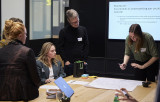
Professionals in the field of circularity and sustainability may experience "eco-emotions," a spectrum of feelings which can have both negative and positive effects on mental health. Eco-emotions arise from ecological crises, such as climate change, and can lead to stress, fatigue, and a sense of powerlessness, but also heightened motivation for professionals.
This work session, led by Marian Zandbergen (CIRCOLLAB, HvA) and moderated by Mareille de Bloois (Royal HaskoningDHV) on the 14th of December, explored the challenges and opportunities associated with eco-emotions, both personally and within organizations. The key question addressed was: How can individuals and organisations constructively manage eco-emotions, and what implications does this have for organisations?
Defining eco-emotions
Eco-emotions are feelings resulting from ecological crises, which can be categorized into backward-looking and forward-looking emotions.
- Backward-looking eco-emotions: include eco-guilt, eco-grief, and eco-anger about past events, such as feeling guilty about the carbon footprint of a vacation flight.
- Forward-looking eco-emotions: encompass eco-anxiety, and focus on current and anticipated future decisions. While eco-anxiety can drive proactive engagement with ecological issues, excessive amounts may lead to feelings of helplessness.
Negative eco-emotions can thus harm your mental health and can even lead to burnout. Therefore, it is important to use strategies to counter the negative effects of eco-anxiety.
Changing attitudes - taking action
Attitudes shape behaviour, and self-efficacy—the belief in one's ability to contribute to problem-solving—is crucial. Concrete action perspectives empower individuals, fostering a sense of control over problems and mitigating feelings of helplessness of eco-anxiety.
Social support - acting as a group
Collaborative efforts within a group can positively impact perceived self-efficacy. Strong collaboration can turn negative effects of eco-anxiety into positive outcomes. Trust and shared motivation play vital roles in effective collaborations, fostering understanding across personal and organisational perspectives.
In the group - recognition and solutions
The participants of the workshop shared personal experiences of eco-emotions and brainstormed constructive ways to incorporate these emotions into circular transition collaborations. Ideas included conducting organizational research to understand the extent of eco-emotions and gain insight into personal motivations in businesses and collaboration, and demonstrating how intrinsic beliefs contribute to shared goals.
Proposed solutions
To address eco-emotions within organizations, various methods were proposed, including workshops with inspiration and practical applications, an HR framework, 'meet & share' sessions featuring talks with industry leaders, and personal purpose hours.
Marian expressed a desire to continue researching this topic, inviting contributions through qualitative interviews within organizations. Are you interested in contributing to this research, please let me know in the comments, or email me at noor@amsterdamsmartcity.com.
Join our team! Circular Economy and LCA Team lead
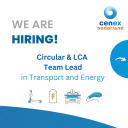
Are you an experienced professional in Circular Economy and Life Cycle Assessments and eager to lead a team of experts in zero-emission mobility and energy infrastructure? If so, we have the perfect opportunity for you!
WHO WE ARE
Cenex Nederland is a not-for-profit research organisation and consultancy specializing on zero emission mobility, energy infrastructure and circular economy. Our mission is to support our customers and partners in making the world a better place to live and travel.
We are a compact but rapidly growing team with complementary expertise. We foster a work environment that is supportive, encouraging self- initiative, and promoting independence. Join our fun and professional team where sustainability and innovation are considered 'business as usual'!
Following the motto 'Alone we can do so little; together we can do so much' we collaborate with governments and industry parties helping then achieve their zero emission transport goals.
Amsterdam may be our hometown, but our activities and ambitious agenda have an international reach. We frequently engage in European or international projects working together with other professionals.
YOUR ROLE
The world of e-mobility is evolving rapidly. Not only are battery and hydrogen electric vehicles becoming an integral part to the transport and energy landscape, but the focus on their lifecycle impact and circular economy within the industry’s value chain is also gaining significant traction. Should you join us, you will be leading a small team of Life Cycle Assessment (LCA) experts and will be contributing in various research and consultancy assignments. Your daily activities would include:
• Leading a growing team of circular economy and LCA experts, offering guidance and support
• Managing EU-fundedR&D projects in the field of transport and renewables
• Conducting research, modelling and analysis of environmental, social and economic lifecycle impacts of products within the transport and energy industries.
• Leading the development of eco-design tools, circular economy roadmaps and policy frameworks to support public or private organisations in achieving their circularity goals.
• Writing project proposals and engaging with prospect clients.
• Reviewing and writing scientific and public-facing reports
• Presenting at conferences, organising training sessions and workshops
YOUR PROFILE
The role of Circular Economy & LCA Team Lead within Cenex NL encompasses a variety of specialisms. We are seeking a new colleague who meets the following requirements:
Essential
• A minimum of five years in roles related to circular economy consultancy and/or research, or other relevant experience.
• Relevant Master’s degree (such as Industrial Ecology, Industrial Design, Engineering, Environmental Sciences).
• Demonstrated project management experience and ability to responsibly manage multiple projects.
• Experienced in using LCA software to quantify environmental, social and economic impact.
• Strong affinity/experience with mobility, transport, and energy sectors and related technologies
• Ability to deliver value and quality to our customers and partners (verbally and written)
• Self-starter and completer of assignments
• Willing and able to travel (inter)nationally with some regularity
• Already living in the Netherlands with an existing work-permit to work in NL Fluent in English, written and spoken
Desirable
• Experience in people management
• Experience with (EU) funding programmes (such as Horizon Europe)
• Dutch (at minimum A2 level) and/or additional languages
• Driving licence
CONTACT DETAILS
Do you see a good match? Send us your <strong>CV and motivation letter</strong> to hello@cenexgroup.nl We look forward to hearing from you!
Vacature: Communicatiemedewerker (10 uur per week)
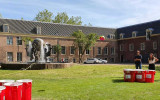
Ben jij student communicatie, hbo of wo? Zoek je een geweldig leuke, flexibele bijbaan als communicatiemedewerker, met veel eigen verantwoordelijkheid in hartje Amsterdam? Solliciteer direct!
Amsterdam Economic Board is op zoek naar een enthousiaste student die per 1 februari 2024 het communicatieteam helpt met mailings, content en events. We werken op een geweldige plek in Amsterdam: het Marineterrein. Je kunt ook vanuit huis werken en je eigen tijd indelen. De 10 uur per week verdeel je, in overleg, over een aantal dagen.
Wie zijn wij?
Amsterdam Economic Board is het netwerk van bedrijven, kennisinstellingen, overheden en maatschappelijke organisaties met wie je samenwerkt aan de slimme, groene en gezonde Metropool van Morgen. Onze grote kracht is ons sterke en relevante netwerk, zoals onze Board, de Network Council, Young on Board en andere partners met wie we bouwen aan coalities. Dat doen we binnen de belangrijke, maatschappelijke thema’s waar Amsterdam Economic Board aan werkt. Samen zetten we initiatieven in gang, als antwoord op complexe uitdagingen.
Wie ben jij?
- Je bent student communicatie (hbo of wo)
- Je vindt het leuk om ervaring op te doen in een dynamisch communicatieteam
- Je bent gemotiveerd om je te verdiepen in de onderwerpen waar we aan werken
- Je bent een aanpakker die makkelijk switcht tussen taken. Je werkt planmatig, bent praktisch en dienstverlenend
- Je durft vragen te stellen en met oplossingen te komen
- Je hebt uitstekende kennis van de Nederlandse en Engelse taal (een schrijfopdracht kan deel uitmaken van de sollicitatieprocedure)
- Ervaring is niet nodig, maar mag natuurlijk wel.
Wat ga je doen als communicatiemedewerker?
- Je publiceert actuele content op onze website (WordPress) en social media-kanalen (LinkedIn en X)
- Je geeft event-uitnodigingen en de nieuwsbrief vorm in Mailchimp en verzorgt eventregistratie in Eventbrite
- Je helpt bij diverse events en bijeenkomsten
- Je maakt presentaties in Powerpoint
Wat bieden wij?
- Een functie per 1 februari 2024 voor 10 uur per week
- Een werkweek die is aangepast aan je studierooster. Je verdeelt je werktijd flexibel over minimaal 3 dagen (binnen kantooruren)
- Een jaarcontract
- Je verdient €17,78 bruto per uur, aangevuld met vakantie- en eindejaartoeslag en diverse vergoedingen.
Interesse gewekt?
Dan horen we graag van je! Stuur uiterlijk 3 januari 2024 je cv en een korte motivatie via solliciteren@amecboard.com. Na de sluitingsdatum maken wij een selectie en hoor je of we je uitnodigen voor een kennismakingsgesprek kort daarna. Een schrijfopdracht kan deel uitmaken van de procedure.
Neem voor meer informatie over de functie contact op met Andrea Joosse via a.joosse@amecboard.com of 06 23 06 38 38. En bekijk vooral onze website. Hopelijk spreken we elkaar snel!
Waag Open: miso magic
Wegens succes herhaald!
Nederland is een broodland. We eten tussen de middag het liefst een ouderwets bammetje met kaas. Maar wat te doen met al dat oude brood?
Erika Hirose ontwikkelde een ‘kit’ waarmee je van oud brood Japanse miso kan maken. Erika haar man, Martin, koppelt de data van het fermentatieproces via sensoren aan geluid. Tijdens deze Waag Open editie kan je zelf aan de slag met het maken van miso én muziek. Neem je oude, overgebleven brood mee. Restjes aardappels pasta, rijst of noodles rijst mag ook.
Het belooft een avond te worden voor alle zintuigen!
Programma
19.15 - 19.30 uur Inloop
19:30 - 19:45 uur Welkom
19:45 - 20:15 uur Geschiedenis van Miso (en voedselverspilling)
20:15 - 21:15 uur Miso maken
21:15 - 21:30 uur Testen en proeven
21.30- 22:00 uur Borrel
Waag Open
Elke eerste donderdagavond van de maand opent Waag haar deuren! Kom langs om te discussiëren en te doen. Want we gaan niet alleen in discussie over maatschappelijke thema's en de toekomst - je leert daarnaast ook altijd iets praktisch.
Iets dat je altijd al hebt willen uitproberen, zoals de 3D-printer in het FabLab, of juist iets dat je nooit had verwacht, zoals uitpluizen hoe DNA in elkaar zit in ons biotech-lab. Waag Open vindt plaats in (een van) de maakplaatsen op de eerste en tweede verdieping van het historische Waaggebouw op de Nieuwmarkt.
Toegankelijkheid
Omdat het Waag-gebouw een beschermd monumentaal pand is, is het helaas niet voorzien van een lift. Dit evenement vindt plaats in de Makersguild op de eerste verdieping van het Waag-gebouw.
Mocht je krap bij kas zitten en wel graag aan dit evenement willen deelnemen, neem dan contact op met tanja [@] waag [punt] org.
Amsterdam Region’s Insights on Local Green Deals during COP28
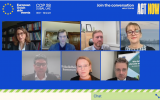
Participating in a COP28 side event organized by the European Commission, the Amsterdam Region delved into Local Green Deals as instrument for achieving the green transition. The primary goal for the session was to uncover actionable strategies and prerequisites essential for fostering public-private collaboration to realize the sustainability transition. Marja Ruigrok, vice-mayor for the municipality of Haarlemmermeer, represented the Amsterdam Region alongside political and business leaders from Braga (Portugal), Aalborg (Denmark) and Skelleftea (Sweden).
Commencing the session, Valentina Superti, DG for Internal Market, Industry, Entrepreneurship, and SMEs at the European Commission, highlighted Europe's ambition to become the first climate-neutral continent by 2050. This necessitates a transformative shift towards sustainability, digitalization, and resilience, which is why the Commission is introducing critical legislation like the Net-Zero Industry Act and the Critical Raw Materials Act.
Ruigrok shared insights from the Amsterdam Metropolitan Region’s efforts in establishing Local Green Deals, emphasizing her role as political ambassador and champion for the Green Deal Bikes initiative. She stressed the importance of cycling, explaining that despite its reputation as a cycling paradise, approximately 20% of young people in the Amsterdam Region can not ride a bike: “If you don’t learn to ride a bike at a young age, you are also much less likely to use a bike for commuting later in life. That’s why in this Green Deal, we stimulate young people to learn to ride bikes, and encourage employers to support commuting by bike. This is crucial because employees who bike take on average 2.5 fewer sick days compared to those who don’t bike.”
Reflecting on success factors, Ruigrok emphasized the need for political commitment, and clear project ownership: "From a political point of view, you need long term commitment, and you have to create ownership. Someone has to take ownership and say ‘this is my project.’ This might be a governmental agency, a company, a knowledge institution, or civil society organisation - but someone has to take the lead. Otherwise, you will continue to talk, and nothing will happen."
Throughout the session, participants provided practical insights and recommendations for fostering successful public-private collaborations in general, and Local Green Deals in specific:
- Lasse Frimand Jensen, mayor of the City of Aalborg, emphasized the necessity of accountability mechanisms: “Mutual commitment is necessary and there must be mechanisms in place to keep each other accountable.”
- Ricardo Rio, mayor of City of Braga and Member of the European Committee of the Regions, highlighted the role of local authorities in mobilizing capacity and engaging stakeholders: “Local authorities need to have the spirit to engage stakeholders and shape partnerships. We also need governance models that tranced political cycles, and that allow people to participate and hold us accountable.”
- Jens Broberg, representing the business sector, emphasized the urgent need for appropriate incentives: “Governments must use policy frameworks to incentivize and regulate businesses and industry towards a green economy.”
- Evelina Fahlesson, vice-mayor of Skelleftea Municipality emphasized the need for open and honest dialogue: “As a municipality, you have to be open about your challenges and willing to start a dialogue with your citizens and companies. Use procurement and new financing models as tools to implement a shared vision.”
- David Nordberg, from Skanska Sweden, encouraged business leaders to align their business models with sustainability ambitions: "Be brave: try new ways of doing business and work in collaborations. In the long term, there is no conflict between sustainability and the economy."
The session highlighted the pivotal role of collaborative multi-stakeholder partnerships in achieving the green transition, emphasizing sustained political commitment, robust governance structures transcending political timelines, and policy frameworks incentivising sustainable businesses.
In the context of COP28, the true challenge lies in replicating these successful approaches on a wider scale, extending beyond the relatively affluent European context to a global landscape with more limited resources. In many regions, the urgent and acute impacts of climate change are already pervasive, amplifying the need for swift, comprehensive action. This necessitates a global and concerted effort of nations and industries, to surmount the hurdles posed by resource scarcity and varying levels of socio-economic development. This calls for collaboration not only within regions but across continents, fostering knowledge-sharing, technology transfer, and collective efforts in tackling climate challenges. The urgency of the climate crisis demands a united global front, where the lessons learned and successes achieved in Local Green Deals can serve as guiding principles towards a more sustainable and resilient future for all.
Research project - Shifting circular: urban infrastructure and policy changes towards renewed territorial metabolisms
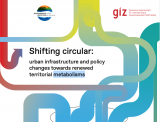
Find out this comparative analysis of critical policies and infrastructures essential for advancing the urban circular transition!
This piece of work draws upon the insights garnered from the experiences of four European cities, including Amsterdam. Reflecting on pivotal levers and obstacles pivotal in catalyzing socio-ecological transformations towards alternative urban metabolisms forms the crux of this exploration. This insightful report, commissioned by the Deutsche Gesellschaft für Internationale Zusammenarbeit (GIZ), the German agency for international cooperation, has been recently unveiled within the Circular Economy Solutions Dialogue (CESD) under the auspices of the Think20 (T20) working group focused on sustainable urbanization.
As a PhD researcher, I am now embarked on another research project on circular policies and strategies. One of my fieldwork is based in Amsterdam, spanning from January to April 2024. I am enthusiastic about establishing connections and potentially collaborating during my stay in the city!
Digital Society School: Showcase Fall '23

Our Showcase is here - tap into the potential of transformation design and create transformation ripples with us!
On January 24th, come and explore the projects carried out by the trainee teams from our Digital Transformation Intensive Programme dedicated to shaping an inclusive, sustainable and diverse society. Get inspired, learn more about how Transformation Design is done and meet fellow changemakers in our Clubhouse or online via our YouTube livestream.
Our trainee projects focus on the integration of technology into society and design for the UN Sustainable Development Goals (SDGs) through topics such as Sustainability Monitoring, Digital Health & Well-being, and Regenerative Cities, among others. In 20 weeks, they learn to work responsibly and sustainably by using design, technology and social innovation together with one of our partners.
We have prepared an exciting programme for you:
16:00 - 17:00 Mini-keynotes:
- "Digital Activism" by Marleen Stikker, director & founder of Waag Futurelab
- "Learning Communities" by Zlatina Tsvetkova, Learning & Knowledge Manager at Commonland
- "Systemic Design" by Andrea Nesta, Experience Design Lead at Nomads
17:00 - 18:00 Clubhouse exhibition of design solutions of trainee teams
18:00 - 20:00 Networking & drinks
There will be plenty of opportunities to connect with the trainees, partners and the extended Digital Society School community, so don't miss out!
Hoe brengen we weer lucht in het stikstofvraagstuk?
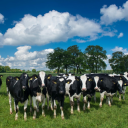
De problematiek rondom stikstof is complex en ingrijpend. Ze is diep verweven met uiteenlopende sectoren, belangen en maatschappelijke discussies. Van de veehouderij tot de industrie, van de woningbouw tot de luchtvaart: de opgave die er ligt is enorm — ook voor overheden. Tegen welke dilemma's lopen zij aan? Hoe is de onderlinge rolverdeling? En welke concrete stappen kunnen overheden zetten om zaken weer vlot te trekken? Een dubbelinterview met Deloitte’s Gijsbert Duijzer, Partner Real Estate bij Deloitte, en Mario Kortman, Director Major Programs Public Sector bij Deloitte.
Gijsbert Duijzer kent de stikstofproblematiek op het platteland van binnenuit. Hij heeft in Wageningen gestudeerd en woont op een boerderij in de Gelderse Vallei: nergens in Nederland is de stikstofopgave groter dan daar. In zijn directe omgeving ziet hij veehouders op dit moment worstelen met hun toekomst-perspectief en signaleert hij veel wantrouwen in de (rijks)overheid.
Mario Kortman heeft uitgebreide ervaring in het begeleiden van complexe en politiek gevoelige dossiers voor de rijksoverheid, onder meer voor de ministeries van Economische Zaken, Sociale Zaken en Financiën. Hij is op z'n best als gangmaker van grootschalige transformaties voor beleidsdepartementen en uitvoeringsorganisaties.
Om te beginnen, waar zit de grootste uitdaging?
Kortman: "In de kern draait het om de vraag: hoe kom je tot een gebiedsgerichte aanpak die werkt? Hoe zorg je dat rijk, provincies en gemeenten elkaar gaan vinden in het belang van de regio? En dat al die verschillende lagen van stakeholders ook echt met elkaar gaan samenwerken? Dat organiseren is bij stikstof al extreem ingewikkeld. In die dynamiek spelen ook technische aspecten een rol. Zoals met wat voor model je stikstof meet en of de uitkomst van zo’n model zwart of wit is. Als je daarover een knoop hebt doorgehakt en een fragiele balans hebt gevonden tussen alle belangen, dan moet je dat ook nog toetsen aan de menselijke maat. Met andere woorden: hoe organiseer je na al die afspraken en modellen en regels ook nog ruimte voor individueel maatwerk? Ga er maar aan staan."
Wat wordt er specifiek van de overheid verwacht?
Duijzer: "Uiteindelijk draait het allemaal om twee vragen: 'Wat wordt het beleid?' en 'Hoe gaan we het uitvoeren?'. In dit dossier hebben we het dan concreet over perspectief en duidelijkheid bieden aan de agrariërs. Als overheid zul je boeren op korte termijn helderheid moeten bieden. Alleen dan kunnen zij onderbouwd keuzes maken. En op de lange termijn zijn betrouwbaarheid en voorspelbaarheid cruciaal, maar wees ook transparant als die helderheid nog niet op alle fronten geboden kan worden."
Bij wie zou de regie moeten liggen?
Duijzer: "Rijk, provincies en gemeenten hebben allemaal een cruciale rol. De rijksoverheid zal stabiele kaders moeten bieden voor de lagere overheden, zodat zij die kunnen invullen. Maar wie gaat er formeel over de natuurvergunning? Dat is de provincie. Zij is het bevoegd gezag dat een uitspraak kan doen over het langjarige perspectief van een boerenbedrijf op een specifieke plek. En die provincies komen net uit de verkiezingen, ze hebben zojuist nieuwe gedeputeerden aangesteld. Zij zitten met veel vragen, kijken naar het rijk, naar het RIVM, naar Europa... Dat helpt niet om snel duidelijkheid te kunnen geven. Ten slotte moeten we ook de rol van de gemeenten niet vergeten, zij zijn degenen die de boeren het best kennen en vaak veel vertrouwen genieten."
Hoe staan we er momenteel voor?
Kortman: "Veel problemen in onze tijd komen neer op het anders inrichten van de balans tussen economische activiteiten en onze natuurlijke omgeving. Dat is niet eenvoudig. Hoe bescherm je het milieu en onze voedselproductie? Hoe versnel je de reductie van uitstoot, maar verlies je geen mensen onderweg? Als rijksoverheid ben je daar niet altijd op ingericht. Veel vraagstukken overstijgen individuele beleidsdepartementen, bevatten interne tegenstrijdigheden die ook in de overheid zelf tot uitdrukking komen of missen een natuurlijke regiepartner in de samenleving. En dan heeft het stikstofvraagstuk nog een eigen minister — wat voor veel andere integrale vraagstukken niet geldt."
"Wat heb je in dit dossier aan consultants die nog nooit een koe van achteren hebben gezien?"
Duijzer: "En laten we niet vergeten: de samenleving zit niet altijd te wachten op een regievoerende overheid. Op het platteland wordt toch vooral met achterdocht naar de plannen uit Den Haag gekeken. Ook niet zo gek, want boerengezinnen worden geraakt in hun bestaanszekerheid en maatschappelijk worden er heel andere verwachtingen uitgesproken richting de boeren. Daar komt nog bij dat de huidige regelingen natuurlijk open staan voor agrariërs die willen stoppen — maar er zijn er heel veel die juist dóór willen. En ook zij staan momenteel op pauze. Ze weten niet óf ze door kunnen, hoe dan en waar. En wat hun buren gaan doen... Mensen weten niet waar ze aan toe zijn."
Vraagt dat om een andere rol van de overheid?
Kortman: "Absoluut. Het rijk moet structureel met onzekerheden leren omgaan. Immers, techniek is ambigu, wetenschap geeft geen eenduidige antwoorden, de spagaat tussen collectieve en individuele belangen groeit... In de afgelopen tien jaar is besturen gewoon veel ingewikkelder geworden. En dat zal ook niet eenvoudiger worden. Daar moeten we ons op instellen. Anders communiceren, anders kijken naar het mandaat van uitvoerders, naar de samenwerking tussen departementen. Dit speelt nu op stikstof, maar eigenlijk op veel méér terreinen, alleen al als gevolg van klimaatverandering."
Duijzer: "Tegelijk moeten we wel, overal waar het kan, die complexiteit zien te reduceren. Anders kom je eenvoudigweg niet uit de startblokken. Op een gegeven moment moet je zeggen: op de plekken waar we kúnnen beginnen met een gebiedsgerichte aanpak, gaan we ook starten. Dat vraagt om bestuurlijk lef: starten met de uitvoering terwijl er nog vragen open staan."
Misschien een gekke vraag, maar wat werkt níet?
Kortman: "We maken het onszelf vreselijk lastig als we met z'n allen blijven zoeken naar die silver bullet, naar die technische uitweg. Vastklampen aan technologische oplossingen is niet de oplossing. En als we ons vastleggen in complexe akkoorden waardoor er geen flexibiliteit meer is: dat werkt ook niet. Het leidt af én het heeft veel ongewenste neveneffecten. Want iedereen die net iets buiten de norm valt, belandt buiten de regeling — terwijl er maar een fractie verschil is met de buren. We moeten realistisch zijn en beseffen dat kleine stapjes voorwaarts soms het maximaal haalbare is."
Duijzer: "En wees daar ook eerlijk over. Veel zekerheden uit het verleden zijn er vandaag niet meer. Neem bijvoorbeeld de bank. Die financierde boeren altijd op basis van twee zekerheden, naast het onderpand: de vergunning en goedgekeurde technologie. Beide staan nu ter discussie. En dat zou best wel eens blijvend kunnen zijn. Alles kan veranderen. En dat geldt voor de overheid net zo. Als provincies nu op zoek gaan naar garanties voor boeren over vijftien jaar, dan gaan ze die niet vinden. We moeten niet vergeten: op dit moment staat de veehouderij praktisch stil. Bij de bank komen vrijwel geen nieuwe financieringsaanvragen meer binnen. Je moet als overheid durven zeggen dat je die duidelijkheid wél kunt geven voor de komende jaren en een richting voor de langere termijn, maar geen zekerheid voor de komende decennia."
En wat werkt wél?
Duijzer: "Momenteel maken we als onderdeel van onze opdracht van het ministerie van LNV een rondgang langs provincies, gemeenten, de georganiseerde landbouw en andere betrokken partijen om de huidige situatie in kaart te brengen. Onze inzet is: laat je niet verlammen door complexiteit. Er zijn voldoende punten waar je wel degelijk duidelijkheid kunt geven en waar je nu al concrete stappen kunt zetten. Ook als die boodschap niet leuk is. Er zijn nu eenmaal plekken waarvan je al weet: op deze locatie kan ik een boer wél perspectief bieden — maar op die andere plek is dat perspectief er gewoon niet. Begin op die punten met het verschaffen van duidelijkheid."
"Stel je als overheid kwetsbaar op, je hoeft niet alles te weten, maar je moet wel in beweging komen."
Kortman: "Precies. Begin klein waar het kan. Durf te starten zonder dat alle problemen al helemaal opgelost zijn. Ga een constructieve dialoog aan, met belangengroepen, banken en boeren, maar mobiliseer ook alle lagen van de overheid. Stel je als regievoerder kwetsbaar op, je hoeft niet alles te weten, maar je moet wel in beweging komen."
Tot slot: zijn er nog do's en don'ts die het stikstofvraagstuk meer lucht kunnen geven?
Kortman: "Een dichtgetimmerd landbouwakkoord of een technische eindwaarde die alles oplost? Dat gaat niet de oplossing bieden in dit dossier. De onzekerheid en complexiteit zijn daar eenvoudigweg te groot voor. Alleen door transparant te zijn over onzekerheden kun je de stikstofproblematiek verteerbaar en hanteerbaar maken. En als je ondersteuning zoekt van consultants, eis dan dat zij niet de materie platslaan in een kortetermijnoplossing — maar duurzaam begrip hebben van jouw uitdaging. Dat ze de strategische problemen snappen én dat ze met praktische, haalbare oplossingen komen."
Duijzer: "Bij Deloitte werken we vanuit begrip van de situatie, de problematiek en de context, zowel op inhoud en techniek als op de dynamiek in het stakeholderveld. Mooi voorbeeld in dit verband: we hebben voor het ministerie van LNV en de provincies de zaakbegeleiders geworven om met de boeren in gesprek te gaan, om samen op zoek te gaan naar een werkbare oplossing. We snappen welk profiel daarvoor nodig is en weten de juiste mensen te vinden. Verder voeren wij verkenningen uit bij alle betrokken partijen. Wat is er nodig om boeren perspectief te bieden? En wat is er minimaal vereist om te kunnen starten met een oplossing? We zijn vooral een verbinder die kan helpen om verbeteringen daadwerkelijk te realiseren en in te richten. Maar daarvoor moet je dus wel die brug kunnen slaan. Want wat heb je in dit dossier aan een consultant die nog nooit een koe van achteren heeft gezien?"
ICC Phase 2: Kick off in Brussels

The Intelligent Cities Challenge (ICC) is one of the European Commission’s largest city support initiatives supporting European cities in their green and digital transitions. ICC delivers knowledge and support services to cities and their local economies to address two major challenges: making the transition to a net-zero economic model, while enabling social inclusion and sustainable development for every EU citizen.
Cities learn how to address these challenges through Local Green Deals: integrated, multi-disciplinary action plans to lead the green and digital transition across sectors from the built environment, urban mobility and renewable energy systems to tourism or small retailers. Cities become members of a vibrant network, gain access to advisory services, innovation and sustainability management techniques, cutting-edge technology and training and get inspiration and advice from peers and mentor cities.
Building on the success of the previous edition of the ICC programme (2020-22) and Digital Cities Challenge (2017-19), the ICC will now enter Phase 2!
Amsterdam as a Mentor City
Like previous years, Amsterdam has been selected to join the support programme as a mentor city. The city will play a leading support role by guiding the 64 core cities as they embark on their two year journey to create impactful strategies and develop innovative solutions that will place the cities at the forefront of the green and digital twin transition through Local Green Deals. A nice compliment, allowing the Amsterdam Region to share their experiences and learnings from setting up Local Green Deal initiatives over the past years.
The Intelligent Cities Challenge Strategy City Lab: Accelerating the Twin Transition (November 2023)
On 23 and 24 November 2023, over 200 people - a mix of Intelligent Cities Challenge (ICC) core and mentor cities, political leaders and representatives from European institutions gathered for the first time in-person to discuss the status quo of Twin Transition. Through examples and best practices, attendees had the honour to hear from over 30 speakers as they shared insights into collaboration methods, Local Green Deals, climate ambitions, digital transitions and more across the course of 20 sessions.
Amsterdam Smart CIty's Leonie van den Beuken travelled to this gathering in Brussels as one of the representatives of the Amsterdam Region. She summarized her trip as follows:
This EU program helps cities from north to south, east and west to connect, share and learn. A much needed interaction, as we all try to improve the quality of life of our citizens. We all struggle with the ever rising cost of living. And we all want to get our cities to become more sustainable.
None of this comes easy, but we all know that local collaboration plays a key role. Building local coalitions between government, businesses and citizens is one thing, but how do we make sure these so called coalitions of the willing actually become coalitions of the doing?
Some of the learnings we shared from the Amsterdam Region are; the need for political support and the importance of trust and respect.
Local political leadership will inspire and guide society and entrepreneurs to invest and contribute. However, make sure pilotical support doesn’t evolve into political ownership. When that happens, societal parties and businesses tend to step out the coalition.
Take the importance of trust and respect seriously. You need to show long term commitment, take time to create understanding between parties. Take competition between participating SME’s serious and define together how to handle this together. Create a workflow in which smaller parties are allowed to participate less intense but sill feel incorporated.
We'll keep you up to date on our participation in future gatherings and results from ICC Phase 2. Want to know more? Check https://www.intelligentcitieschallenge.eu/
Stay up to date
Get notified about new updates, opportunities or events that match your interests.

